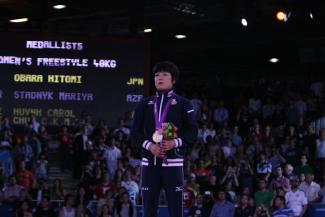#TBT: Tynybekova grabs historic gold for Kyrgyzstan
Thursday, July 21, 2022 - 12:12 By Eric Olanowski
NUR-SULTAN, Kazakhstan (July 21) --- Aisuluu TYNYBEKOVA (KGZ) earned a place in Kyrgyzstan's sporting history as the first wrestler to win a senior world title when she captured the women’s 62kg gold medal with a 5-3 victory over defending champion Taybe YUSEIN (BUL) at the 2019 World Championships.
“When I started wrestling, it was just a dream for me to become world champion,” the then-26-year-old Tynybekova said. “But today, the dream came true.”
Since Kyrgyzstan made its debut at the world championships in 1994, the former Soviet republic had won nine medals---including Tynybekova’s bronze in 2017---but no one had made it to the top of the podium.
Until that Friday night at the Barys Arena in the capital of neighboring Kazakhstan, where a large contingent of compatriots had made the trip and were witness to this moment of national glory.
“Last year, I couldn’t participate in the world championships [in Budapest] because of an injury,” said Tynybekova, who returned to action to win the gold at the Asian Championships in April.
“It was a serious injury and I missed six months of training. At that time, it was hard watching [the World Championships] because I wanted to be there so badly.”
In the final, Tynybekova gave up a point on the activity clock, then scored a takedown to lead 2-1 going into the second period. She added a stepout point, but fell behind 3-3 on criteria when Yusein scored 2 with a stepover with a minute to go.
“It was important for me to control the match from the first second to the last,” Tynybekova said. “That was the strategy of my coach. When the score was 3-3 and there was just 40 seconds, I didn’t panic. I knew I could score 2 points more.”
Indeed she did, tackling the Bulgarian to her back with about 10 seconds to go to secure the historic victory.
“Everyone on my team, my coach and the federation believed in me, and that gave me the power to win,” Tynybekova said.
Tynybekova was a relative late-comer to the sport, only taking it up when she was in her mid-teens. She explained that the countryside where she grew up did not have wrestling clubs. When she became aware of women’s wrestling, she knew that was the sport for her, and made a drastic life decision.
“I was 16 when I started wrestling,” she said. “Before that, I tried many kinds of sports. I was always searching for something interesting.…When I heard there was women’s wrestling in the capital [Bishkek], I gathered all my clothes and moved there.”
Along with the gold medal, Tynybekova also clinched a place at the Tokyo 2020 Olympics. The top six finishers in each of the Olympic weight classes secure berths for their countries. But that was never the main objective.
“My coach said to me that Olympic qualifying is not the main thing,” Tynybekova said. “He was confident I could get the Olympic license. “He said I have to make history for Kyrgyzstan. It’s not only my victory. It’s a victory of my team, of my country. This medal is not only from my effort. Many people contributed.”


Share your thoughts.
Comments